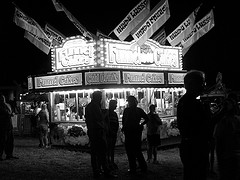Junk Food Binges Acts Like Crack On Brain
Overdosing on junk food acts like heroin or crack on the brain, a new study finds.
Researchers fed a control group of rats normal rat food, and the experimental groups got “cafeteria-style” food, “palatable energy-dense food readily available for human consumption.” The experimental group with extended access to the food ate twice as much as the control.
But the real fun happened when the rats couldn’t get their fat and sugar fix:
When we removed the junk food and tried to put them on a nutritious diet – what we called the ‘salad bar option’ – they simply refused to eat,” noted Kenny. “The change in their diet preference was so great that they basically starved themselves for two weeks after they were cut off from junk food. It was the animals that showed the ‘crash’ in brain reward circuitries that had the most profound shift in food preference to the palatable, unhealthy diet. These same rats were also those that kept on eating even when they anticipated being [given an electric shock].
Researchers said signs of addiction and compulsive eating emerged almost immediately after giving the rats the cafeteria food.
“These data are, as far as we know, the strongest support for the idea that overeating of palatable food can become habitual in the same manner and through the same mechanisms as consumption of drugs of abuse,” said the scientists.
The research has important implications for the study and understanding of the obesity crisis. Might we see wash out clinics where overweight patients are given intravenous oatmeal drips until their brain unwires from junk food addiction?
Food addiction: Fat may rewire brain like hard drugs [Food Navigator]
Subscribe to Ben’s posts by RSS.
Follow Ben on Twitter.
Email ben at consumerist.com
Want more consumer news? Visit our parent organization, Consumer Reports, for the latest on scams, recalls, and other consumer issues.


